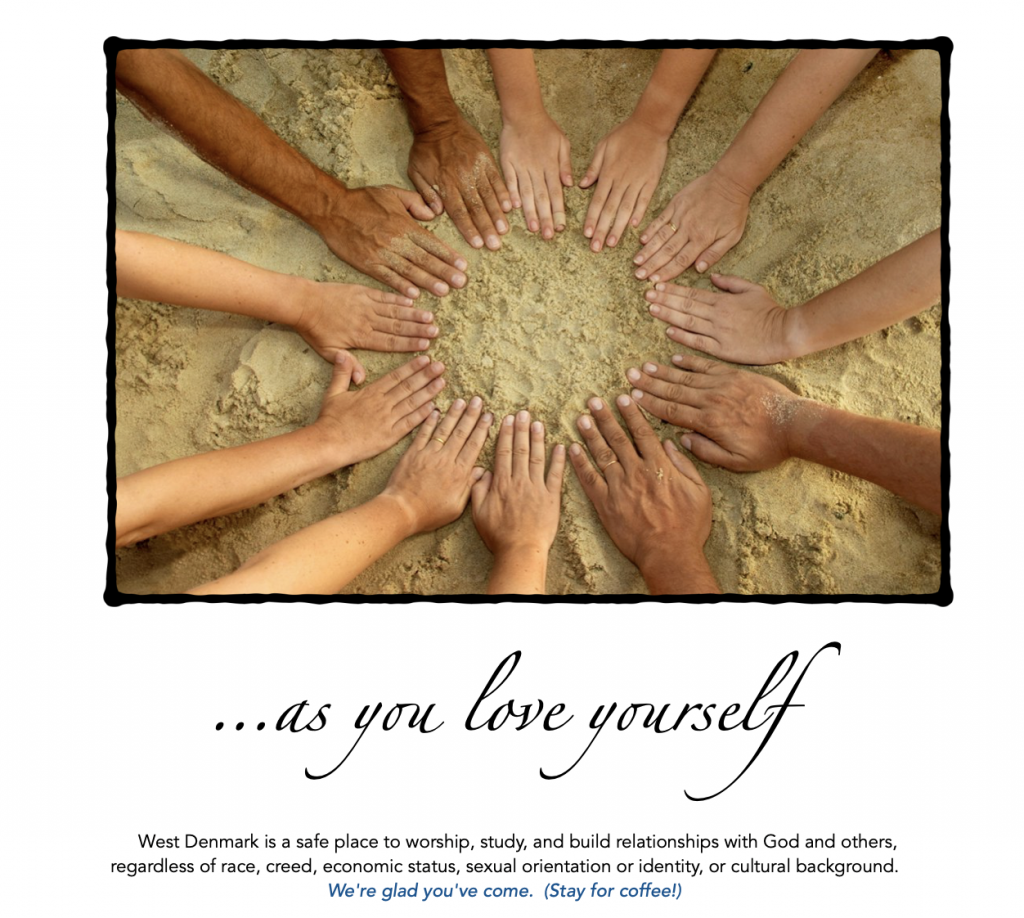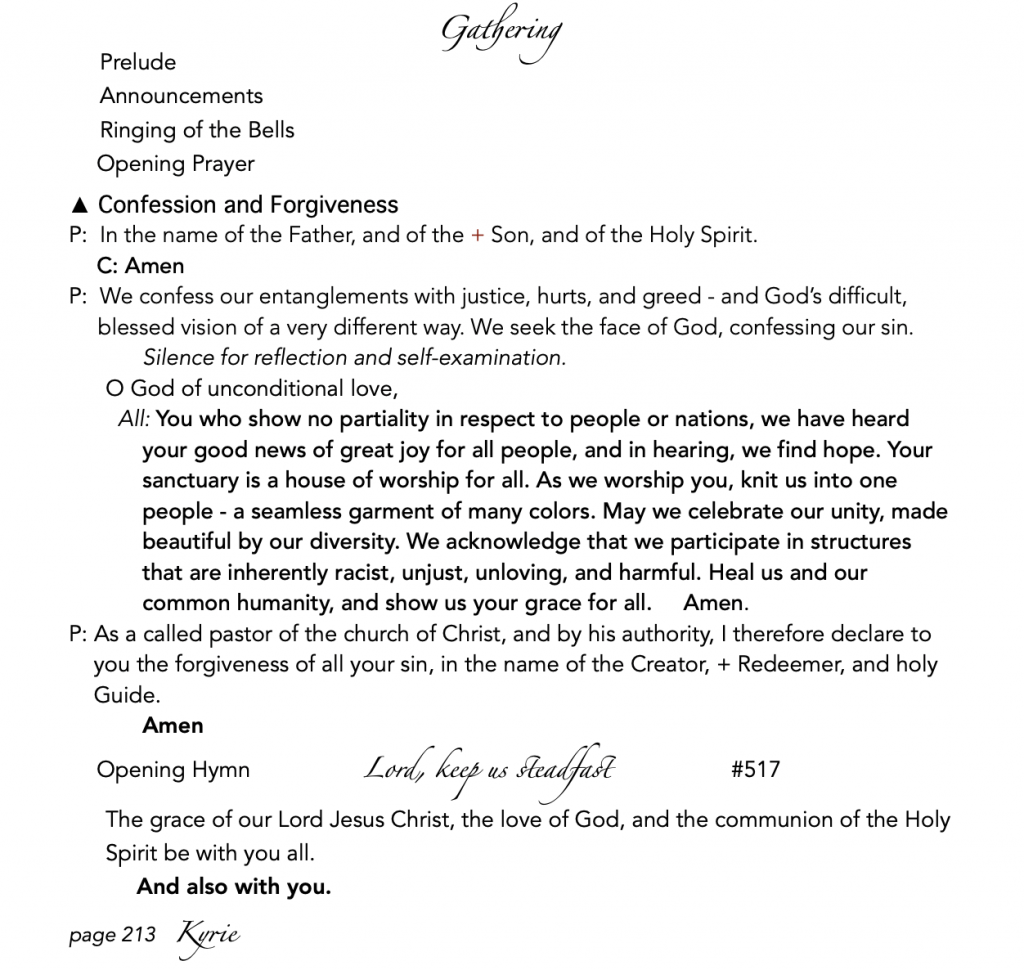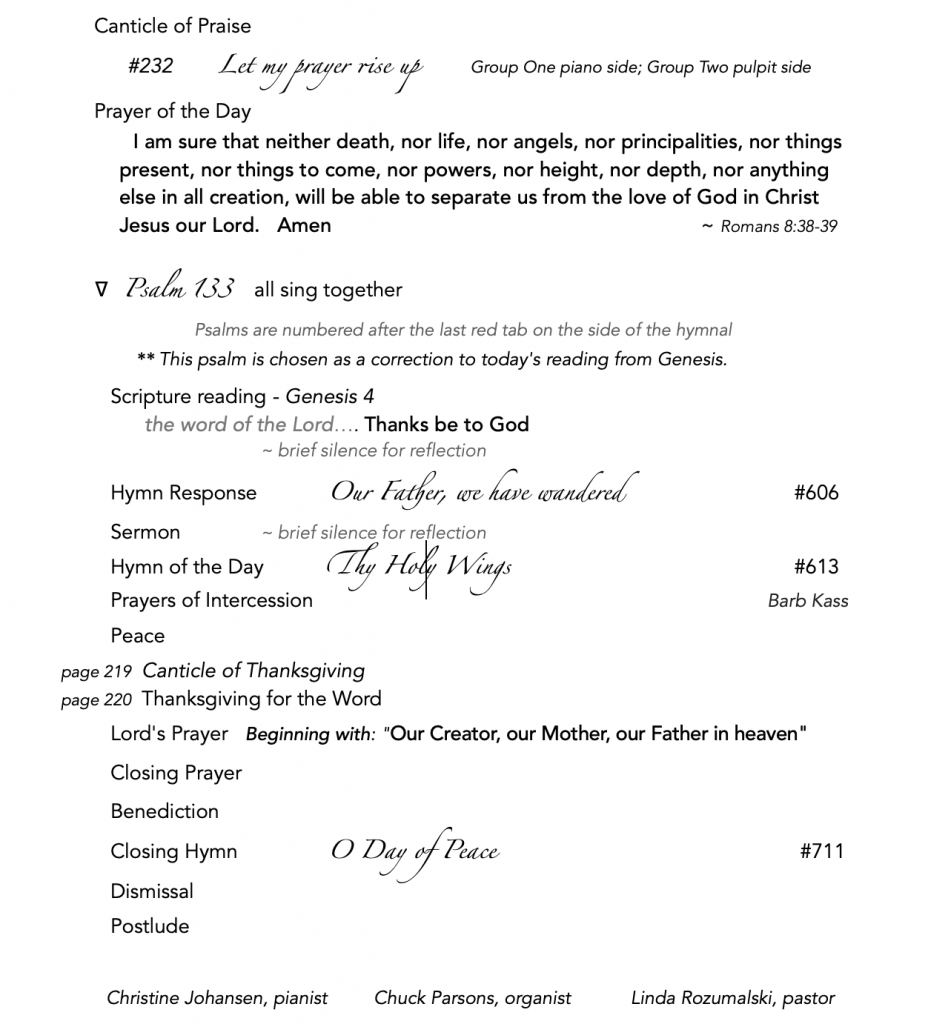


Creation begins each Narrative Lectionary year. Two weeks ago we began with Genesis, chapter 2 and life in the garden. Chapter 3 tells of Adam and Eve’s disobedience in eating the fruit from the forbidden tree in the center of the garden. It ends with this:
3:22Then the Lord God said, ‘See, the man has become like one of us, knowing good and evil; and now, he might reach out his hand and take also from the tree of life, and eat, and live for ever’— 23therefore the Lord God sent him forth from the garden of Eden, to till the ground from which he was taken. 24He drove out the man; and at the east of the garden of Eden he placed the cherubim, and a sword flaming and turning to guard the way to the tree of life.
Genesis 4
Now the man knew his wife Eve, and she conceived and bore Cain, saying, ‘I have produced a man with the help of the Lord.’ 2Next she bore his brother Abel. Now Abel was a keeper of sheep, and Cain a tiller of the ground. 3In the course of time Cain brought to the Lord an offering of the fruit of the ground, 4and Abel for his part brought of the firstlings of his flock, their fat portions. And the Lord had regard for Abel and his offering, 5but for Cain and his offering he had no regard. So Cain was very angry, and his countenance fell. 6The Lord said to Cain, ‘Why are you angry, and why has your countenance fallen? 7If you do well, will you not be accepted? And if you do not do well, sin is lurking at the door; its desire is for you, but you must master it.’
8 Cain said to his brother Abel, ‘Let us go out to the field.’ And when they were in the field, Cain rose up against his brother Abel and killed him. 9Then the Lord said to Cain, ‘Where is your brother Abel?’ He said, ‘I do not know; am I my brother’s keeper?’ 10And the Lord said, ‘What have you done? Listen; your brother’s blood is crying out to me from the ground! 11And now you are cursed from the ground, which has opened its mouth to receive your brother’s blood from your hand. 12When you till the ground, it will no longer yield to you its strength; you will be a fugitive and a wanderer on the earth.’ 13Cain said to the Lord, ‘My punishment is greater than I can bear! 14Today you have driven me away from the soil, and I shall be hidden from your face; I shall be a fugitive and a wanderer on the earth, and anyone who meets me may kill me.’ 15Then the Lord said to him, ‘Not so! Whoever kills Cain will suffer a sevenfold vengeance.’ And the Lord put a mark on Cain, so that no one who came upon him would kill him. 16Then Cain went away from the presence of the Lord, and settled in the land of Nod, east of Eden.
17 Cain knew his wife, and she conceived and bore Enoch; and he built a city, and named it Enoch after his son Enoch. 18To Enoch was born Irad; and Irad was the father of Mehujael, and Mehujael the father of Methushael, and Methushael the father of Lamech. 19Lamech took two wives; the name of one was Adah, and the name of the other Zillah. 20Adah bore Jabal; he was the ancestor of those who live in tents and have livestock. 21His brother’s name was Jubal; he was the ancestor of all those who play the lyre and pipe. 22Zillah bore Tubal-cain, who made all kinds of bronze and iron tools. The sister of Tubal-cain was Naamah.
25 Adam knew his wife again, and she bore a son and named him Seth, for she said, ‘God has appointed* for me another child instead of Abel, because Cain killed him.’ 26To Seth also a son was born, and he named him Enosh. At that time people began to invoke the name of the Lord.
The genealogy at the end of chapter 4 shows that this is also a creation story. In it we see the creation of civilization, of extended family, agriculture, arts, tools. It’s interesting that one of Cain’s descendants takes Abel’s place as the herder and shepherd. It’s also a creation story in that it plays out the genesis of sin. Just as there are two creation accounts back to back, so we are presented with two depictions of the nature and origin of sin. The first was Adam and Eve’s debacle with the fruit tree of the knowledge of good and evil. The irresistible lure of temptation seems to be mixed into the mud from which we came: Adam knew better, but sin was lurking at the door, and they ate the fruit. God both judged them for it, and provided for this couple before sending them into the world outside the garden’s hedges and guarded gate.
Cain, the first child of earth, embodies this dangerous, conflicted knowledge of good and evil. It is a conflict we are well acquainted with. Paul wrote about it in the book of Romans: 7:15″I do not understand my own actions,” he writes. “For I do not do what I want, but I do the very thing I hate. I can will what is right, but I cannot do it…. 21 So I find it to be a law that when I want to do what is good, evil lies close at hand.”
God asks Cain, “Why are you angry, and why has your countenance fallen? 7If you do well, will you not be accepted? [of course you will] And if you do not do well, sin is lurking at the door; its desire is for you, but you must master it.”
You must master it. We must learn to master exuberant puppies, classrooms of first graders and unruly middle schoolers. We must master addictions, our emotions, our desires. If we fail to master them, they will rule over us. “Sin is lurking at the door, its desire is for you.” I appreciate that sin is given this ‘poised to pounce’ quality, this sense of animation. The authors of this story were good observers of human nature.
Like his father before him, Cain had a clear choice. He, too, had a conversation with God. He, too, had time to think this over. He could have mastered his anger, his hurt, his acute disappointment. He could have asked God for an explanation for favoring sheep over grain (which we would all appreciate hearing it). He could have learned to live with his brother despite his jealousy, in spite of feeling victimized by God who – for some unknown reason – chose his brother’s offering over his own.
He could have mastered it. But he didn’t. Instead, we can picture him fuming, spiraling down into rage and justification and vengeance, violence rising. He invites Abel out into the field.
This is such an evocative story. It can take us in any number of directions. Mostly, we read it as the story of Cain and Abel.
It was deeply troubling to the ancient Israelites that those closest to us, those who should be the closest, are often the very ones who cause us the most difficulty and bring us the most pain. For the Israelites the idea of “brothers” became a shorthand way of talking about the problems we face in getting along with each other in God’s world. We are brothers, we are sisters, because we are born of the earth, born of God, born of a common humanity.
It is bad enough to live through the Eighth Day of creation (like Adam and Eve) – to wake up one day outside the garden walls, remembering and reliving the choice that alienated them from God, but it might be harder to be born East of Eden, isolated and scrounging, tilling and tending inhospitable ground, competing and envious and capable of the evil of which we now possess knowledge.
And the “troubles” arising from that knowledge are all too evident. If we are “brothers”, why can’t there be more brotherhood among us? Why can’t siblings get along with each other? Why can’t neighbors live peaceably? Friends? Strangers? Spouses? Nations? Why can’t people who are different from each other live with toleration and amicable curiosity about the other? Why do we so easily fall into hatred and violence and death? These two brothers speak for the whole of us in our disastrous interpersonal and social relationships – and tell a familiar and painful story.
One brother was a tiller of the land, the other a tender of sheep. But honestly, that doesn’t make any difference – because the story isn’t about them or their vocations… their offerings are simply the backdrop, the set up: And, actually, so is the murder.
The story is about Cain, about what lies within and must be mastered – and it’s about our fumbling efforts to understand God’s will and ways that lie beyond us, which cannot be understood, but only experienced, lived with, feared, and longed for… This creation mythic story leads us into all of that struggle. But, really, at the end of the day, I think this is the second chapter of a love story between God and her little ones.
A wild, inquisitive freedom came to life – intensely interested in others – but, in truth, only as the other relates to the self. Envy, jealousy, empathy, love, ecstasy – all the big emotions are triggered by, dependent upon, a relationship with another being. God created us as part of one another and that strife against the other and longing to be whole with the other seems to be mixed in the dust of creation.
God clothed and cared for Adam and Eve before sending them out. And in this second story, God protects and provides for Cain, the murderer of his brother. God ensures his safety, the one who took his brother’s life. God sends him away, but allows him to walk away, the one who is banished and protected. It’a a remarkable view of parental love coming from the God of all creation. I think we, naturally, look at the human side of the story. We can relate to it in so many ways – sibling rivalry, the unfair distribution of advantage, intense emotions, questioning God. We get all of that. But turning our attention to God’s action in the story is maybe more helpful. What does it teach us about mercy? About second chances? About the prerequisites necessary for God’s love? Are there any, for example?
This is the first family. They are the prototypes of humanity – and they model disobedience, pain, jealousy, rage, violence, murder, fear. We aren’t told a single word of their love or compassion or joy.
And yet God’s action is to protect and provide and open futures. That’s not the view of God we too often hear about in terms of our behavior and morality. We are told about judgment and wrath and God choosing only some for salvation. Well, here we have a primal example of God choosing, and we don’t know the why, but we hear in God’s own words that the favoring of one offering over the other had nothing to do with the favoring of one brother over the other. God loved them both, even on the backside of incredible disobedience and death, God loved Cain.
God’s initial action of choosing produces the action of the story. Because it’s not in accepting Abel’s offering, but in accepting Cain, that God’s unfathomable and loving nature is taught.
It is in providing Cain with a protective mark to shield him, in allowing him to wander away from God’s righteous presence, in providing him with life and a wife and son and future – it is in this choosing – without a word of explanation – that we see why the story was told. It’s here that the truth comes out. The good news of God’s over-riding, unexpected love and provision – for even the Cains of this world – is taught through death. This should be no surprise to us. God chooses life over judgment even for those who cannot (do not) master sin pouncing at the door, those who get yanked around on the wrong end of a leash. The next chapter is a genealogy, and when chapter six picks up the narrative, people have begun to populate the world. And this: 5 “The Lord saw that the wickedness of humankind was great in the earth, and that every inclination of the thoughts of their hearts was only evil continually. 6And the Lord was sorry that he had made humankind on the earth, and it grieved him to his heart.”
The consequences of eating forbidden fruit rippled out generation after generation spreading the hubris of thinking we are like God, when there is nothing further from the truth. And still, in spite of this continued grief, God does not change his nature or intentions for human life. There is a strange justice in this kind of love – justice even for Abel, I believe – for everyone. Actually, it is God alone who does not receive justice. She who desires intimacy with her creatures sees them wander away, turn away in disregard, generation after generation, asking for help, but too soon forgetting to love and honor and live into the sacred will.
The parable of the prodigal son, I think, completes/retells the story of Cain. He who has wandered away, finally hits bottom and realizes that he has squandered the greatest gift, and hesitantly, but resolutely, makes a return, practicing his apology, his plea for forgiveness, along the way. The father, however, sees him coming a long way off. And in a manner most undignified, runs all out, arms flung akimbo to embrace this wayward child, kisses his cheeks, puts the family ring on his son’s finger and proclaims a feast.
I realize that that is not the ending of the story we’re given, but I believe it could be. We are given the possibility to master ourselves if nothing else. And when/if we fail, to realize that we can turn, always, and return to the love of God who is ready to open a new path forward. And that might be enough.
Pastor Linda